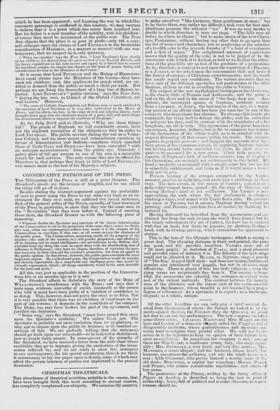CONSERVATIVE PATRONAGE OF THE PRESS.
THE Millennium of the Press is still at a great distance. The Standard's proofs are the reverse of tangible, and we are afraid the tiling will go off in film°. Besides stating the abstract argument against the probability of men in power using the Press in any other way than as an in- strument for their own ends, we adduced two recent instances, first, of the general policy of the Tories, secondly, of their treatment of the Press in particular, to show that they are the same men in the "Revolution" that they were before it. Instead of meeting these facts, the Standard favours us with the following piece Of reasoning.
4, Whatever doubts the Spectator may entertain of the sincere determination of the Conservatives to aid in the promotion of the same object, must, we think, give way, when our contemporary reflects how much it is the interest of the Conservatives to conciliate, if they can—at all events to raise the character of the public press. The Conservatives, possessing, nearly all the property Of the country—the rank of the country in a still greater proportion—and absolutely all its learning and its sound intelligence—are nevertheless, by the Reform Bill, excluded from any thing like even an equal share with the ebandlershop men of influence in Parliament; they have no chance, therefore, of regaining the posi- tion necessary to their own and the country's protection, but from an appeal to the public opinion. In thatforum, however, the public press constitute the most important organs. By a conciliated press, the Conservatives would be actually and directly represented—by a respectable and intelligent press, they would be virtually represented, which; all things considered, would be the most desirable for the press and party."
All this was just as applicable to the position of the Conserva- tives five or six months ago as it is now. The Standard affects to disbelieve the story of the Duke of WELLINGTON'S interference with the Press ; and says that it rests upon evidence unworthy of credit, inasmuch as the person who told it must have been guilty of a violation of confidence in so doing. This, however, does not prove the story to be false. But it is very possible that there was no violation of confidence on the part of our witness : it depends on the conditions of the compact. The Duke, too, may have broken his part of the agrcement, and justified the disclosure. "Some wag," says the Standard," must have passed this story upon the Spectator's credulity." We rather think not. The Spectator is probably not more credulous than its neighbours, or very apt to impose upon the public by fictitious or ill-vouched as- sertions of fact. We are perfectly willing that the statement should go forth upon our own credit—to be believed or disbelieved, just as people think proper. In consequence of the remarks of the Standard, we have received a letter from the individual whose credibility they go to impugn, giving the particulars ef the trans- action referred to; and we are ready to show this statement to our contemporary, for his special satisfaction, though we think it unnecessary to lay our pages open to details, some of which may affect the private interests of parties not implicated in the present discussion.
















 Previous page
Previous page